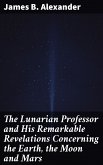In "The Lunarian Professor and His Remarkable Revelations Concerning the Earth, the Moon and Mars," James B. Alexander crafts an imaginative narrative that marries scientific curiosity with fantastical elements, delving into the realms of astronomy and metaphysics. Using a distinctive blend of erudite prose and playful dialogue, Alexander constructs a thrilling speculative exploration. Set against the backdrop of the late 19th-century scientific revolution, the book challenges contemporary perceptions of our celestial neighbors while reflecting the broader anxieties and aspirations surrounding the advancement of science during that era. James B. Alexander is a writer with a profound interest in the intersections of science and literature, which is evident in his meticulously researched approach to storytelling. His background in both physics and creative writing informs his ability to navigate complex scientific theories while maintaining engaging narratives. Alexander's fascination with the cosmos has driven him to not only explore astronomical concepts but also to comment on humanity's place within the universe, offering critical insights into our existential questions. This book is highly recommended for readers drawn to speculative fiction and those who appreciate the intricate dance between science and imagination. Alexander's work invites readers to contemplate extraordinary possibilities while providing a rich tapestry of ideas that provoke thought and inspire further inquiry into the mysteries of the universe.
Dieser Download kann aus rechtlichen Gründen nur mit Rechnungsadresse in A, B, BG, CY, CZ, D, DK, EW, E, FIN, F, GR, H, IRL, I, LT, L, LR, M, NL, PL, P, R, S, SLO, SK ausgeliefert werden.









